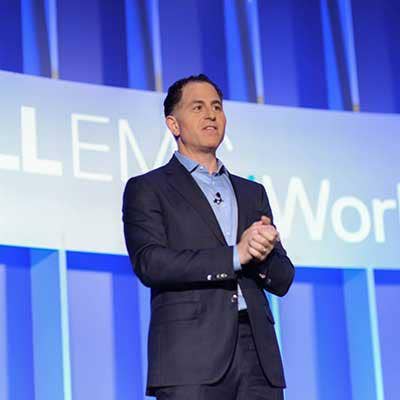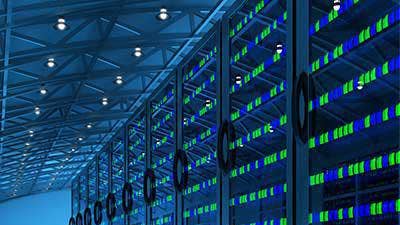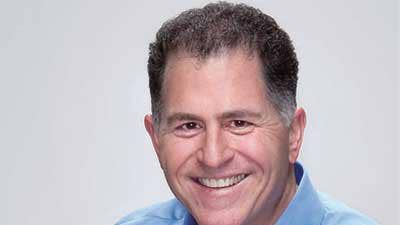Michael Dell On The Impact of China Tariffs, Public Cloud Backlash And VMware Synergies

Taking On The Competition
Dell Technologies CEO Michael Dell says the competition doesn't stand a chance against his company when it comes to digital transformation, as more customers want to buy from a market leader who can provide it all.
"When customers and decision-makers look at the breadth of the portfolio with all of our strategically aligned businesses – VMware, Dell, Pivotal, RSA, Boomi, Virtustream and SecureWorks – we have really an unmatched set of capabilities. Our innovation engine is cranked up on high," said Dell in an interview with CRN Tuesday evening. "There's another company that starts with the letter 'H' that has a similar data center business. Their business grew 3.5 percent in the same three months where we grew 24 percent."
This year, Dell Technologies has taken over the leadership position in worldwide storage and servers, while the company's PC business has been on fire. During the interview, Dell talked about how organizations are taking their public cloud budget back on-premises, the synergies he's seeing with VMware, the potential impact of China tariffs on the U.S. and Dell's "big advantage" against the competition.

Are you seeing public cloud repatriation, where customers are moving more workloads from the public cloud to software-defined data centers?
We are. In fact, we highlighted this at our recent analyst day. There is a fairly significant amount of repatriation going on. As much as 80 percent of the customers across all segments – small, medium, large – are reporting that they're repatriating workloads back to on-premises systems because of cost, performance and security.
Are you surprised by that? It seems like you've called this all along.
You know, go back and replay the tapes from 2014 and 2015 when we were talking about this then. It's one of the reasons why we made a big bet on Dell EMC and VMware. And it's playing out in a way which is consistent of what we thought. So there you go.

How big of a competitive advantage is it for customers to have the hardware and multi-cloud environment integration with Dell Technologies in terms of cost savings and performance?
It's a big advantage. It's all about time to market and ease for customer deployment. Our traditional competitors don't have those kinds of capabilities. With VMware and Pivotal, we're building out this multi-cloud architecture rapidly to give customers incredible flexibility. By the way, a very high percentage of those workloads are landing on-premises. When you automate and software-define the infrastructure and infrastructure becomes code, the on-premises systems become incredibly efficient. If you take a look at the competitive field out there, who else is really doing that? The answer is "no one." No one has the set of capabilities that we have or is investing as much as we are in that space. I think customers recognize that. They're voting with their dollars.

Do you have enough supply in terms of PC processors to meet demand in the fourth quarter?
That's a good question. You guys have written about some of the supply challenges. We're working hard to meet all the demand. We're certainly not immune to the challenges there, but we're doing our best to make sure we can meet all of the demand.
What's driving Dell's PC growth this year?
When you look at growth across the portfolio, the big trend has been customers seeing the strength of the entire portfolio of offerings and saying, "Hey do I really want to buy 20 smaller, less capable companies, or would I rather buy everything from Dell Technologies?" And more and more customers are voting to buy everything from a company that is No. 1 in everything. So that means we're gaining share in storage for a couple quarters in a row now: for servers, quite dramatically; in clients, VMware is growing quickly; Pivotal; SecureWorks – all members of Dell Technologies are benefitting because each of the parts are stronger because of the whole. That's certainly benefitted the client business and the other businesses as well.

Do you expect any of the China tariffsto have an increase on Dell costs?
Well there's some, and we, like every company, are making adjustments to our supply chain. In some cases, if the input costs are changing, obviously we'll reflect those through our products.
Do you think you'll be forced to pass on costs through price increases on some of Dell products?
If you look at memory prices, for example, when memory prices have been going up, certainly you saw that reflected in the price of the products. Look, there are various future scenarios around tariffs, I don't exactly know which scenario will emerge, but we are prepared and continuing to adjust to make sure we can meet the commitments to our partners, to our customers, and we're doing that every day.
When you look ahead to 2019, do you see tariffs impacting your optimistic outlook for customer appetite for digital transformation and services?
I'd say it's a risk, but I'm not going to say, "My dog ate my homework." Our business is doing really well, and we're gaining share. If there are some changes in the global trade landscape, that doesn't slow down the urgency and priority for digital transformation. Customers will still face those opportunities and challenges that go along with the digital transformation, irrespective of what happens in the trade discussions.

Is your technical collaboration with VMware at an all-time high?
Yes, it keeps advancing. We have found all sorts of ways to partner together with Workspace ONE, NSX, with everything going on in the software-defined data center. You see it coming through in the products. We announced a whole series of new products at VMworld. You'll continue to see that collaboration advance. VMware has done a great job in enabling and preparing for the multi-cloud world, and obviously it's a very important part of Dell Technologies. The revenue synergies have been super strong. Partners and customers like and appreciate that we're bringing them a complete solution. We do that, not just across Dell EMC and VMware, but also for Pivotal. We have this Pivotal Ready Architecture, which is built on VMware and on top of our infrastructure, and customers absolutely love that. The more we can collaborate together across the Dell Technologies family, the better we're doing. The results are pretty conclusive when you go back to that 24 percent growth in the data center business. By the way, the prior quarter it was up 25 percent.
How big is the potential for game-changing solutions for data center customers with Pivotal Ready Architecture built on VMware?
The Dell EMC partnership with VMware is really the foundations of this. As customers go down the path of wanting to create cloud-native applications that are really cloud-neutral and cloud-agnostic, meaning that they want to decide where they deploy those applications -- some may be on-premises, some may be in a colocation facility, some may be in a public cloud, some may be on a customer's premises – what they quickly realize is it's not the public cloud versus the private cloud, it's a multi-cloud environment. So Cloud Foundry enables this developer-friendly environment that is cloud neutral and cloud agnostic, so you see Pivotal continue to grow quickly.
Once companies go down that path they go, "Hey, how am I'm going to deploy this?" [We can say,] "Well, guess what? We have the Pivotal Ready Architecture. It already runs and works well with your VMware environment and Dell EMC infrastructure." That's taking off very quickly. There's a lot of demand for that. There are truly companies that say, "Hey, I'm doing all these new requirements. It's got to be multi-cloud. The answer isn't one or the other, it's both."
What's your strategy with Workspace ONE?
By bringing together all the innovations from our client business, from VMware's Workspace ONE and AirWatch, and embedding those together, we created a fabulous solution. We have with WorkSpace ONE well over 50 million devices under management and growing very, very fast. It's a great opportunity for partners to add value and to help organizations transform their environments for the people that actually do the work. It turns out the primary device for productivity in the office is still the PC.

What did you see as far as channel momentum for Dell in the last quarter?
Overall, channel revenues were up 22 percent. Client was up 19 percent, servers were up 32 percent, storage was up 15 percent, and the channel momentum continues to be great with record numbers of deal registrations, great progress with new and reactivated customers. Partners are embracing the strategy we have and Dell Financial Services (DFS) continues to do really well. In the United States, DFS originations in the channel were up 33 percent in the first half of the year. That's really important because the partners that finance with DFS have typically grown twice as fast as the ones who don’t. We're gaining share. We're growing. The economy overall is doing quite well generally here in the U.S. and around the world. There's an explosion in the amount of data and infrastructure required … When customers and decision makers look at the breadth of the portfolio with all of our strategically aligned businesses – VMware, Dell, Pivotal, RSA, Boomi, Virtustream and SecureWorks – we have really an unmatched set of capabilities. Our innovation engine is cranked up on high. There's tons of new products and capabilities coming out.
What kind of momentum were you seeing overall for Dell in your second fiscal quarter?
Growth is balanced across all of our business units, our regions and customer segments. We're the undisputed worldwide share leader in x86 servers for the second quarter in both units and revenue. Server revenue in the channel was up 32 percent year-over-year. We had triple-digit growth in our converged and hyper-converged VxRail and VxRack, including $1 billion in cumulative revenue since launching VxRail. We're now No. 1 in hyper-converged. We had a record quarter in client in terms of units shipped, while we also expanded average selling prices. We out-performed the PC client sector with the highest share position ever in units overall and also in commercial units. We continue to increase our No. 1 positions in displays and workstations. When you look at the overall financial performance, it's pretty clear against the other companies out there – our data center business was up 24 percent. There's another company that starts with the letter 'H' that has a similar data center business. Their business grew 3.5 percent in the same three months where we grew 24 percent. This has been happening for several quarters in a row. Dell Technologies is doing really well.

What impact do you expect the economic climate to have on digital transformation spending going into next year?
Organizations of all kinds are realizing that there is an explosion in data, and you have to figure out what to do with that data and express your differentiation as a company with software and with that data. If you haven't already moved down that path pretty significantly, you're probably doing it wrong. This requires all kinds of new capabilities and tools -- this is broadly referred to as digital transformation. It's driving a lot of spending. When I was in Europe two weeks ago, we had a partner roundtable and we had all the major partners from all across Europe. When I look at our growth rate and hear their growth rate, I think the industry can grow much faster than the so-called experts are [predicting]. It certainly looks to be quite a healthy market, and I don’t see any signs of that slowing down.

Michael, what's the call to action for partners?
The opportunity has never been better. I do think we're at the beginnings of a technology-led investment cycle that is very substantial. We have an advantage with our set of capabilities. [Dell EMC channel chief] Joyce Mullen and her team have done a fabulous job in bringing this to partners and taking us from strength to even more strength. We're looking forward to a very strong second half.
Steven Burke contributed to this story